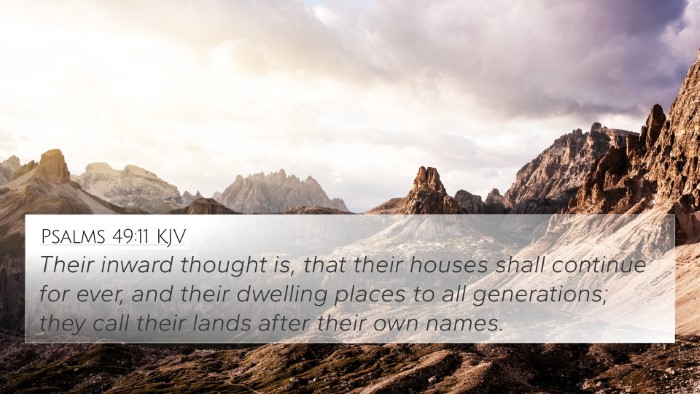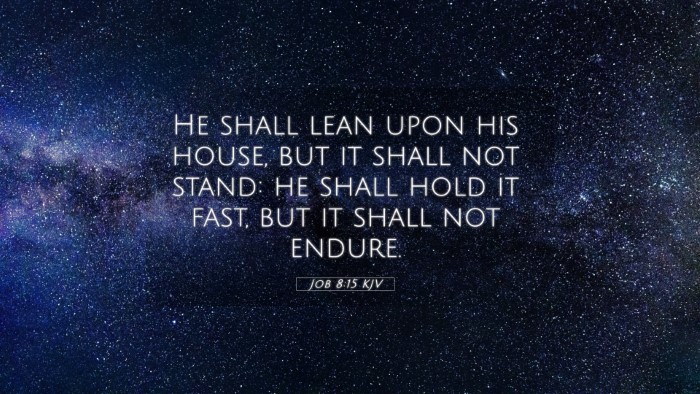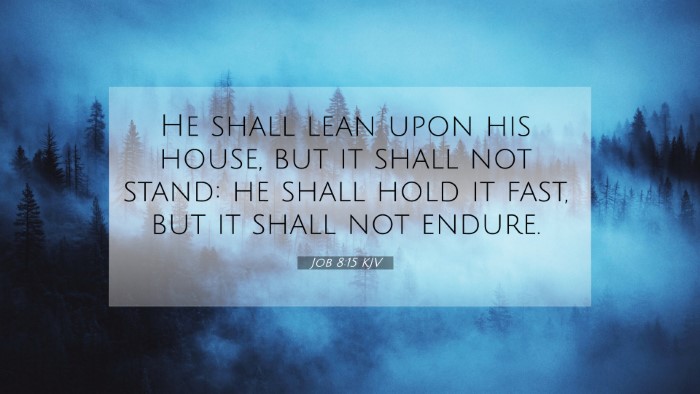Old Testament
Genesis Exodus Leviticus Numbers Deuteronomy Joshua Judges Ruth 1 Samuel 2 Samuel 1 Kings 2 Kings 1 Chronicles 2 Chronicles Ezra Nehemiah Esther Job Psalms Proverbs Ecclesiastes Song of Solomon Isaiah Jeremiah Lamentations Ezekiel Daniel Hosea Joel Amos Obadiah Jonah Micah Nahum Habakkuk Zephaniah Haggai Zechariah MalachiJob 8:15 Similar Verses
Job 8:15 Cross References
He shall lean upon his house, but it shall not stand: he shall hold it fast, but it shall not endure.
Uncover the Rich Themes and Topics of This Bible Verse
Listed below are the Bible themes associated with Job 8:15. We invite you to explore each theme to gain deeper insights into the Scriptures.
Job 8:15 Cross Reference Verses
This section features a detailed cross-reference designed to enrich your understanding of the Scriptures. Below, you will find carefully selected verses that echo the themes and teachings related to Job 8:15 KJV. Click on any image to explore detailed analyses of related Bible verses and uncover deeper theological insights.

Matthew 7:24 (KJV) »
Therefore whosoever heareth these sayings of mine, and doeth them, I will liken him unto a wise man, which built his house upon a rock:

Luke 6:47 (KJV) »
Whosoever cometh to me, and heareth my sayings, and doeth them, I will shew you to whom he is like:

Job 18:14 (KJV) »
His confidence shall be rooted out of his tabernacle, and it shall bring him to the king of terrors.

Psalms 52:5 (KJV) »
God shall likewise destroy thee for ever, he shall take thee away, and pluck thee out of thy dwelling place, and root thee out of the land of the living. Selah.

Psalms 112:10 (KJV) »
The wicked shall see it, and be grieved; he shall gnash with his teeth, and melt away: the desire of the wicked shall perish.

Psalms 49:11 (KJV) »
Their inward thought is, that their houses shall continue for ever, and their dwelling places to all generations; they call their lands after their own names.

Proverbs 10:28 (KJV) »
The hope of the righteous shall be gladness: but the expectation of the wicked shall perish.
Job 8:15 Verse Analysis and Similar Verses
Understanding Job 8:15
Job 8:15 states, "He shall lean upon his house, but it shall not stand: he shall hold it fast, but it shall not endure." This verse is part of the discourse presented by Bildad the Shuhite, one of Job's friends, who is responding to Job's lament regarding his suffering.
Commentary Insights
This verse conveys the idea of reliance on something that is inherently unstable. Biblical commentaries elaborate on the overarching themes of trust and the consequences of placing hope in transient things.
- Matthew Henry's Commentary: Henry emphasizes that those who lean on a house, symbolizing their worldly possessions or security, will find it is not steadfast. He highlights the fleeting nature of earthly support and the necessity of reliance on God alone.
- Albert Barnes' Notes: Barnes notes that Bildad rebukes Job for his misplaced confidence, implying that reliance on his own righteousness is as futile as leaning on a fragile dwelling. He stresses the inevitable collapse of any support apart from God.
- Adam Clarke's Commentary: Clarke interprets the house as the metaphor for Job's wealth and prosperity. He argues that those who trust in their own power and status will eventually face downfall, drawing a parallel to the fate of the wicked.
Thematic Connections in Scripture
This verse illuminates several critical themes within the Bible, especially regarding human reliance on material rather than divine strength. The following cross-references provide deeper insights:
- Psalms 62:10: "Trust not in oppression, and become not vain in robbery: if riches increase, set not your heart upon them." - This verse highlights the instability of wealth and the folly of placing trust in it.
- Proverbs 11:28: "He that trusteth in his riches shall fall: but the righteous shall flourish as a branch." - This speaks to the ultimate fate of those who rely on material wealth versus the prosperity of the righteous.
- Isaiah 40:6-8: "The voice said, Cry. And he said, What shall I cry? All flesh is grass..." - This passage reminds us of the frailty of human endeavors and the temporary nature of our existence.
- Matthew 7:24-27: "Therefore whosoever heareth these sayings of mine, and doeth them, I will liken him unto a wise man, which built his house upon a rock..." - A foundational text illustrating the importance of building one’s life on a firm foundation, representing Christ.
- Luke 12:20: "But God said unto him, Thou fool, this night thy soul shall be required of thee: then whose shall those things be, which thou hast provided?" - This verse critiques the man who relied on his wealth rather than God, ultimately leading to his demise.
- 1 Timothy 6:17: "Charge them that are rich in this world, that they be not high-minded, nor trust in uncertain riches..." - Paul cautions against the dependence on riches, echoing the lesson found in Job 8:15.
- Jeremiah 17:5: "Thus saith the LORD; Cursed be the man that trusteth in man, and maketh flesh his arm..." - This underscores the danger of placing trust in human strength or resources rather than God.
The Importance of Cross-Referencing
Cross-referencing biblical texts is essential for gaining a comprehensive understanding of the themes present in Scripture. By studying connections between Bible verses, one can identify overarching truths and enhance their spiritual insights.
Tools for bible cross-referencing, such as a bible concordance and bible cross-reference guide, can assist readers in effectively navigating the Scriptures. Learning to cross-reference through dedicated cross-reference Bible study methods fosters a deeper comprehension of the biblical narrative and assists in sermon preparation.
Conclusion
In summary, Job 8:15 invites profound contemplation about the nature of dependence and the transient quality of worldly supports. As we leverage bible verse cross-references and tools available for studying Scripture, we can uncover powerful connections between Bible verses that reinforce our understanding of God’s character and His expectations for His people.



